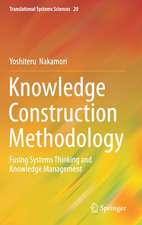Knowledge Technology and Systems: Toward Establishing Knowledge Systems Science: Translational Systems Sciences, cartea 34
Editat de Yoshiteru Nakamorien Limba Engleză Paperback – 15 iun 2024
The knowledge system creates ideas from data and knowledge through knowledge technologies. Based on the proposition that knowledge emerges by the interaction between explicit and tacit knowledge, another definition is possible: “The knowledge system is a system that promotes interaction between codified and personalized knowledge and creates ideas for solving a specific problem.” Codified knowledge includes data and information, while personalized knowledge is empirical knowledge or wisdom that is difficult to put into words.
Building a knowledge system requires mathematical or intelligent knowledge technology and participatory knowledge technology to create or manage codified knowledge and personalized knowledge. For example, a company builds cross-sectional knowledge systems by gathering human resources from various departments, according to the purpose, as in new product development or sales promotion. Chapter 1 defines knowledge technology and the knowledge system and organizes the challenges in their development, while Chapters 2 through 9 introduce mathematical or intelligent knowledge technologies by researchers at the forefront of knowledge technology development.
| Toate formatele și edițiile | Preț | Express |
|---|---|---|
| Paperback (1) | 884.92 lei 38-44 zile | |
| Springer Nature Singapore – 15 iun 2024 | 884.92 lei 38-44 zile | |
| Hardback (1) | 1114.02 lei 6-8 săpt. | |
| Springer Nature Singapore – 14 iun 2023 | 1114.02 lei 6-8 săpt. |
Din seria Translational Systems Sciences
- 20%
 Preț: 628.87 lei
Preț: 628.87 lei - 15%
 Preț: 642.51 lei
Preț: 642.51 lei - 18%
 Preț: 948.92 lei
Preț: 948.92 lei - 18%
 Preț: 786.52 lei
Preț: 786.52 lei - 20%
 Preț: 661.65 lei
Preț: 661.65 lei - 18%
 Preț: 720.68 lei
Preț: 720.68 lei - 18%
 Preț: 782.57 lei
Preț: 782.57 lei -
 Preț: 384.09 lei
Preț: 384.09 lei - 18%
 Preț: 728.43 lei
Preț: 728.43 lei -
 Preț: 447.24 lei
Preț: 447.24 lei - 15%
 Preț: 654.30 lei
Preț: 654.30 lei - 18%
 Preț: 783.20 lei
Preț: 783.20 lei -
 Preț: 389.11 lei
Preț: 389.11 lei - 18%
 Preț: 882.82 lei
Preț: 882.82 lei - 18%
 Preț: 884.22 lei
Preț: 884.22 lei - 18%
 Preț: 728.91 lei
Preț: 728.91 lei - 18%
 Preț: 723.69 lei
Preț: 723.69 lei - 18%
 Preț: 776.09 lei
Preț: 776.09 lei - 18%
 Preț: 891.48 lei
Preț: 891.48 lei - 18%
 Preț: 1106.31 lei
Preț: 1106.31 lei - 18%
 Preț: 1106.79 lei
Preț: 1106.79 lei - 18%
 Preț: 775.30 lei
Preț: 775.30 lei -
 Preț: 385.08 lei
Preț: 385.08 lei - 15%
 Preț: 635.65 lei
Preț: 635.65 lei - 18%
 Preț: 941.68 lei
Preț: 941.68 lei - 18%
 Preț: 944.99 lei
Preț: 944.99 lei - 18%
 Preț: 1113.26 lei
Preț: 1113.26 lei - 18%
 Preț: 1114.02 lei
Preț: 1114.02 lei
Preț: 884.92 lei
Preț vechi: 1164.37 lei
-24% Nou
Puncte Express: 1327
Preț estimativ în valută:
169.32€ • 177.27$ • 140.11£
169.32€ • 177.27$ • 140.11£
Carte tipărită la comandă
Livrare economică 01-07 aprilie
Preluare comenzi: 021 569.72.76
Specificații
ISBN-13: 9789819910779
ISBN-10: 9819910773
Pagini: 287
Ilustrații: IX, 287 p. 1 illus.
Dimensiuni: 155 x 235 mm
Ediția:2023
Editura: Springer Nature Singapore
Colecția Springer
Seria Translational Systems Sciences
Locul publicării:Singapore, Singapore
ISBN-10: 9819910773
Pagini: 287
Ilustrații: IX, 287 p. 1 illus.
Dimensiuni: 155 x 235 mm
Ediția:2023
Editura: Springer Nature Singapore
Colecția Springer
Seria Translational Systems Sciences
Locul publicării:Singapore, Singapore
Cuprins
1. Defining Knowledge Technology and Systems.- 2. Big Data Analytics in Healthcare.- 3. Knowledge Discovery from Online Review.- 4. Machine Learning for Solving Unstructured Problems.- 5. Qualitative Modeling to Extract Knowledge for Problem Structuring.- 6. Agent-Based Simulation of Low Carbon Emissions Product Diffusion.- 7. Emotional Product Development: Concepts, Framework, and Methodologies.- 8. Knowledge Synthesis and Promotion.- 9. Group Decision Making.
Notă biografică
Yoshiteru NAKAMORI received a Ph.D. degree in applied mathematics and physics from Kyoto University in January 1980. He joined the Japan Advanced Institute of Science and Technology in April 1998 as a professor at the School of Knowledge Science. Since then, he has been working on the development of knowledge science, incorporating the approaches of systems science. His recent research interest is the knowledge construction systems methodology, which integrates approaches in systems thinking and knowledge management. From April 2002 to March 2008, he served as the dean of the School of Knowledge Science, Japan Advanced Institute of Science and Technology. From November 2003 to December 2008, he served as the president of the International Society for Knowledge and Systems Sciences. From April 2008 to March 2010, he served as a vice-president of the International Federation of Systems Research. Since April 2010, he has been an academician of the International Academy for Systems and Cybernetic Sciences
Textul de pe ultima copertă
This book discusses technology and systems to create valuable ideas from data through the construction of knowledge. The primary concern is to make better decisions about economic and management issues in today’s information-flooded society. Human creative activity is in the realm of soft technology, with no physical entity to operate. Focusing on the ability of knowledge as judgment power, this definition results: “Knowledge technology is soft technology that underpins the human creative activities of converting data and information into knowledge, creating new ideas based on that knowledge and validating those ideas.” That definition includes a wide range of soft technologies developed in informatics, management studies, and systems science.The knowledge system creates ideas from data and knowledge through knowledge technologies. Based on the proposition that knowledge emerges by the interaction between explicit and tacit knowledge, another definition is possible: “The knowledge system is a system that promotes interaction between codified and personalized knowledge and creates ideas for solving a specific problem.” Codified knowledge includes data and information, while personalized knowledge is empirical knowledge or wisdom that is difficult to put into words.
Building a knowledge system requires mathematical or intelligent knowledge technology and participatory knowledge technology to create or manage codified knowledge and personalized knowledge. For example, a company builds cross-sectional knowledge systems by gathering human resources from various departments, according to the purpose, as in new product development or sales promotion. Chapter 1 defines knowledge technology and the knowledge system and organizes the challenges in their development, while Chapters 2 through 9 introduce mathematical or intelligent knowledge technologies by researchers at the forefront of knowledge technology development.
Caracteristici
Defines knowledge technology as a technology that produces value from data through knowledge creation Describes knowledge system as promoting the interaction between codified and personalized knowledge to create ideas Introduces mathematical/intelligent technologies from researchers at the forefront of knowledge technology development
























